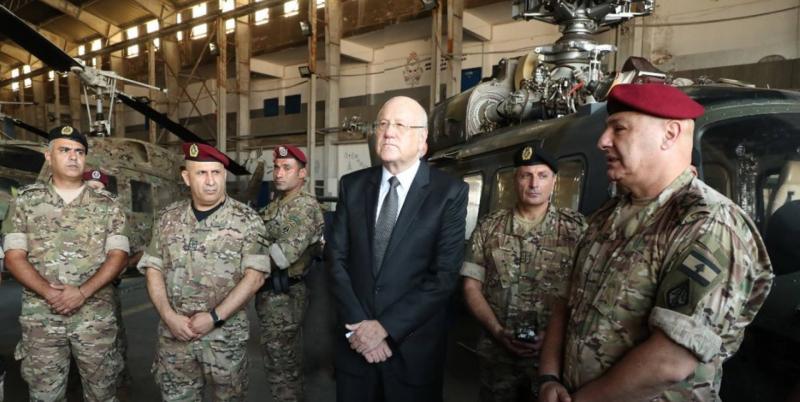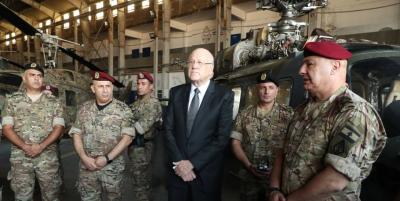"Hezbollah" faces a difficult equation in deciding its options for filling the vacancy in the leadership of the Lebanese Army with the current Commander, General Joseph Aoun, being retired on January 10. Its hesitation in determining its final choice provides a pretext for caretaker Prime Minister Najib Mikati to stall in convening the Cabinet to consider postponing Aoun's retirement, which he sees as the only option. This way, he distances himself from appointing a new army commander that could drag him into a crisis with Maronite Patriarch Bechara al-Rahi and the Christian opposition forces.
Mikati has resolved not to convene the Cabinet to take a decision regarding postponing General Aoun's retirement for six months unless "Hezbollah" takes the initiative to announce its position. This is to ascertain whether it will position itself midway between Bkerke and the leader of the "Free Patriotic Movement," MP Gebran Bassil, rather than aligning with one side. However, al-Rahi maintains his stance on deferring the appointment of an army commander until after the election of a president because it is not appropriate to appoint him without having the prevailing opinion in the selection process. Meanwhile, Bassil demands that a successor to Aoun be appointed, firmly rejecting in any form the postponement of Aoun's retirement or any extension of his term, primarily due to the lack of political chemistry between them, ultimately reducing his chances as a leading candidate for the presidency.
Despite Mikati not ceasing communication with the political aide to Hezbollah's Secretary-General, Hussein Khalil, and his counterpart, Ali Hassan Khalil, the party remains in a phase of hesitation. Therefore, the problem does not lie in securing a quorum for the Cabinet session but rather in the choice it will make and whether it will participate in the session without voting on postponing General Aoun's retirement.
At the same time, Speaker Nabih Berri will ensure the required Shiite cover for the government's vote on his proposal, which faces opposition from the caretaker Minister of National Defense, retired General Maurice Sleem, on the grounds that the request to postpone retirement falls within his jurisdiction and should not be overridden. He enjoys complete support from former President Michel Aoun and his political heir, MP Bassil. Berri's approval for postponing the retirement comes amid an understanding with his strategic ally "Hezbollah," and does not suggest a divergence in position if the party participates in the session without voting on the decision, unless there is consideration for its hostile ally "the National Movement," which has stood firmly alongside Hezbollah since the beginning of the confrontation between the party and Israel along the northern front.
Berri confirms to his visitors that options are limited to appointment or extension, with no third option or delegation. This implies, according to prominent parliamentary sources, a rejection of Security Minister Sleem issuing a memorandum to delegate the highest ranking officer, the full member of the military council, General Pierre Saab, to act on behalf of the army commander in managing military affairs once he is retired.
Therefore, if postponing General Aoun's retirement in the Cabinet proves impossible, alongside Mikati's refusal to appoint a new army commander, it will inevitably fall within the Parliament's determination. In this case, the Shiite duo avoids a confrontation with Bkerke, having been the first to encourage a meeting between the Deputy Chair of the Supreme Islamic Shia Council, Sheikh Ali Khatib, and Patriarch al-Rahi in preparation for a spiritual summit, which is complemented by the good relationship between Bkerke and Ain al-Tineh, the second presidential headquarters.
Until it becomes clear whether the government will decide to delay General Aoun's retirement, Parliament, with the voice of its president, is preparing to intervene to prevent the extension of the vacancy in the military institution, given its significance among state institutions that have not yet been affected by the disintegration of state administrations. This opens the door for dialogue between parliamentary blocs to agree on a formula that combines proposals for extending General Aoun's term, raising the retirement age for military personnel, or extending it to the heads of security agencies, all of which benefit from delaying the retirement since Berri wants to wash his hands of appointing a new commander, as that falls within the government's authority.
Thus, filling the vacancy in the army command stands between two options: delaying retirement or extending General Aoun's term as a step towards completing the military council's formation by appointing a chief of staff and directors for general administration and the inspection office, which is essential for reactivating the military institution's role.




